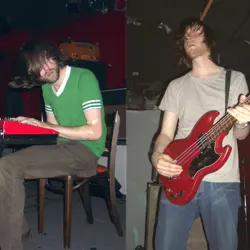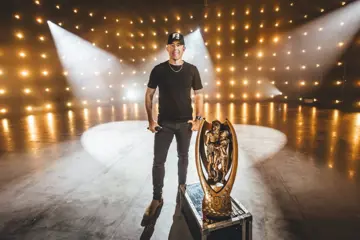 Ratatat
RatatatRatatat's recently released fifth album Magnifique marked the Brooklyn duo's first in over five years. After spending most of the '00s on the promotional grind — their first four albums made, released, and toured "back-to-back-to-back" — the band took a break following shows for 2010's LP4, including a stint in Australia in early 2011 that marked their last dates before going on hiatus.
"We took four years off touring," says Evan Mast, Ratatat keyboardist/producer, who splits the duo with guitarist Mike Stroud. "Having that long break has made me really appreciate it more, now. Having people come out to your shows, having really young people, new listeners, and feeling their energy, it's something that's really amazing and that you shou always stop to appreciate."
"I think music has this extra timeless quality to it when there's no vocals."
In the years Ratatat were on the shelf, and off the road, Mast and Stroud kept working on music and chased something that had been a long-held goal: working as producers for big ticket rappers. They practised with old mixtapes (2004's Ratatat Remixes Vol. I and 2007's Vol. II) in which they sampled the likes of Jay Z, Missy Elliott and Dizzee Rascal over their own productions. It was part exercise in working out how to produce for rappers, part calling card for hopeful future collaborations. And, eventually, it paid off, big-time, with Mast producing 100$ Bill, a track Jay Z made for the soundtrack to Baz Luhrmann's 2013 monstrosity The Great Gatsby.
"I'd been a huge fan of Jay Z for a long time, so it was a huge thrill," Mast says. "He's a good person to work with because he's really attentive and he doesn't make you go through all these levels of management to talk to him or give you feedback. But the frustrating thing about working with a huge artist like that is that you don't have as much control as you'd like. With that track, there ended up being things that happened to it after I'd done my part that I wasn't too psyched about."
Don't miss a beat with our FREE daily newsletter
This experience lead Mast to feel a little jaded about producing for others, and plenty excited about returning to Ratatat's signature, sinuous sound. "It's fun to collaborate with people and work with rappers and vocalists, but at the moment it feels totally like a sideline, something I want to only do every once in a while," he says. "The stuff that I'm most proud of, out of everything I've ever made in my whole life, has been instrumental. I think music has this extra timeless quality to it when there's no vocals."
This means that Magnifique continues Ratatat's 15-year rebellion against the notion that instrumental music is lacking a 'topline'. "There's a whole segment of the music industry that's totally not interested in, or willing to accept, music without vocals," Mast says. "Which is weird to me, [because] I grew up listening to pop instrumental music. I had a bunch of organ records from the Salvation Army, dudes like Earl Grant and Lenny Dee. Then Herb Alpert, Apollo 100, The Ventures, stuff like that. Most instrumental music now is more moody or experimental or soundtracky kind of stuff. There's not really that much poppy instrumental music, you just don't hear it. The last big instrumental pop hit was, what, the Beverly Hills Cop theme song?"















